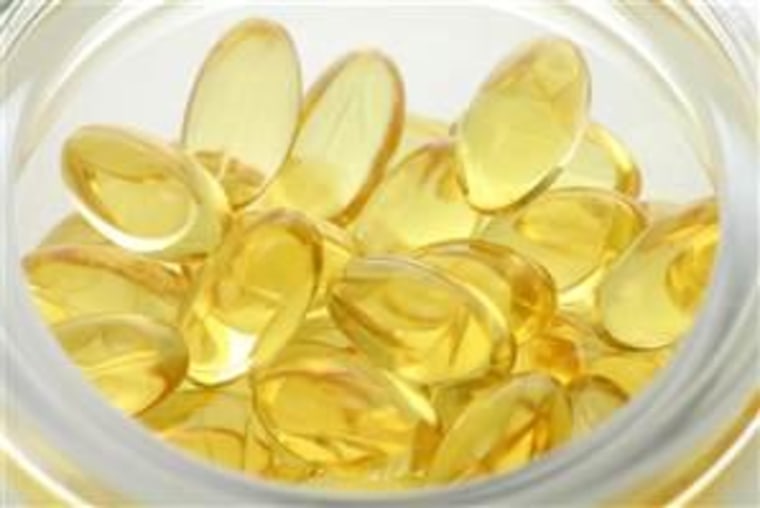Certain supplements that people once hoped would fight cancer may in fact fuel tumors, maybe by knocking out some of the body’s natural defenses against cancer, Swedish researchers reported Wednesday.
Tiny lung tumors grew and spread far more quickly in mice given vitamin E and an antioxidant supplement called acetylcysteine, the researchers reported. Further checks showed the antioxidants interfered with an important cancer-blocking protein called p53.
Their findings may help explain startling studies that suggest smokers who take certain supplements are in fact more likely to develop lung cancer, and they may help explain why popping vitamins and other supplements doesn’t seem to benefit people’s health much.
“The antioxidants caused the mice to die twice as fast,” Martin Bergo, a researcher at the University of Gothenburg in Gothenburg, Sweden who led the study, told reporters on a conference call.
It wasn’t what they were expecting to find. And what’s odd is that the supplements also did what they were supposed to do, which is to reduce DNA damage, they report in the journal Science Translational Medicine.
Antioxidants are chemicals that react with other charged molecules called free radicals. Free radicals can damage cells, including DNA, in the same process that causes rust. Antioxidants neutralize them, and experts believe they are one of many reasons that fruits and vegetables help keep people healthy, because they are loaded with natural antioxidants.
So if food is good, taking the good parts out of food so you can get more must be better, right? Maybe not. Many supplements on the market also aim to boost antioxidants, and Americans are true believers, spending an estimated $12 billion a year on supplements of all kinds.
It was assumed they could prevent cancer, heart disease and other ills by stopping damage to cells and their DNA. But when scientists started doing real studies to see if this was, in fact, the case, they found sobering evidence. One of the biggest studies, done in 1996, showed that smokers who took beta-carotene, which the body turns into vitamin A, in fact had a higher risk of lung cancer than smokers who didn’t take it.
And just last December, two studies showed that vitamin pills didn’t help heart attack survivors or help preserve brain power in aging men.
Yet a survey done in 2012 showed Americans don’t care – 75 percent who take supplements said they would take them even if they are proven not to benefit health.
Few scientists have tried to find out why antioxidants don’t make people healthier when taken as pills. So Bergo and his colleague Per Lindahl tested mice, first giving them tiny little lung tumors, and then giving them vitamin E and another N-acetylcysteine (NAC), an antioxidant sold in health food stores and also used medically to treat overdose with acetaminophen. It’s also being studied as a possible treatment for chronic obstructive pulmonary disease (COPD), which includes emphysema and chronic bronchitis.
“What we found was the antioxidants caused a three-fold increase in the number of tumors and (boosted) tumor aggression,” Bergo said.
Further checks showed the antioxidants – given in doses similar to what people would get by taking supplements – were doing their jobs. They were scavenging the free radicals. But they were also deactivating p53, which is called a tumor suppressor. It helps fix damaged cells or force them to self-destruct before they become tumor cells.
“Our data revealed that antioxidants can also help the tumor cells to escape detection by our own immune cells,” Lindahl said.
This does not mean that antioxidants cause cancer, Bergo and other experts stress. “If you have lung cancer or if you have an increased risk of developing lung cancer, for example if you are a smoker or you have a lung disease like COPD…you can walk around with an insignificant lung tumor for a long time,” Bergo said. “Taking extra antioxidants might be harmful and it could speed up the growth of the tumor.”
But it’s less clear for people who don’t have or precancerous conditions already. "It is still not clear whether or not antioxidants in healthy people may reduce their future risk of lung cancer," Bergo said.
The findings also do not suggest that antioxidants in food could damage health, even in people who do already have cancer. Food contains a range of compounds that may interact in ways that supplements do not.
It’s also not certain these particular findings even translate to people. The researchers used genetically engineered mice that were injected with tumor cells. This only barely resembles how cancer develops in people.
Bergo said he and his team are now checking to see if people who have COPD and are being treated with acetylcysteine might have a higher risk of lung cancer.
